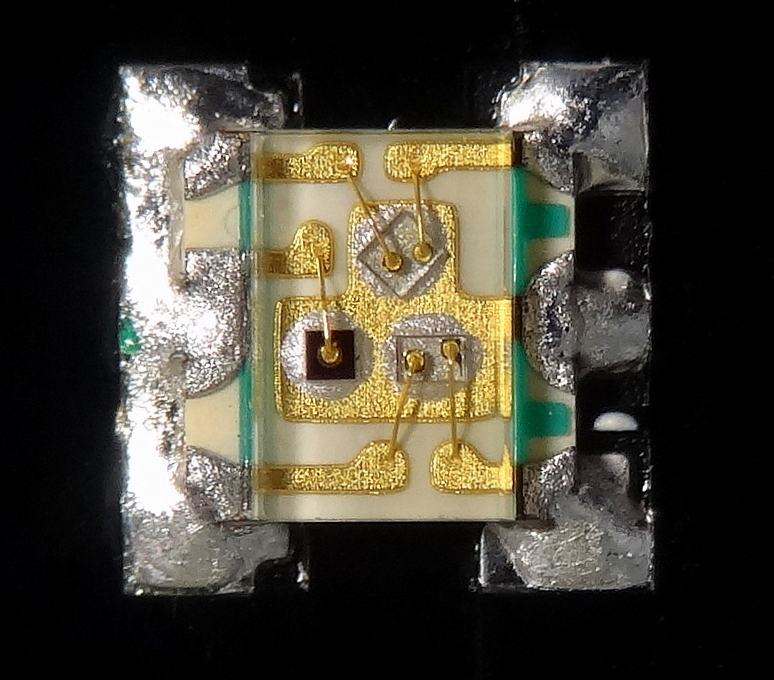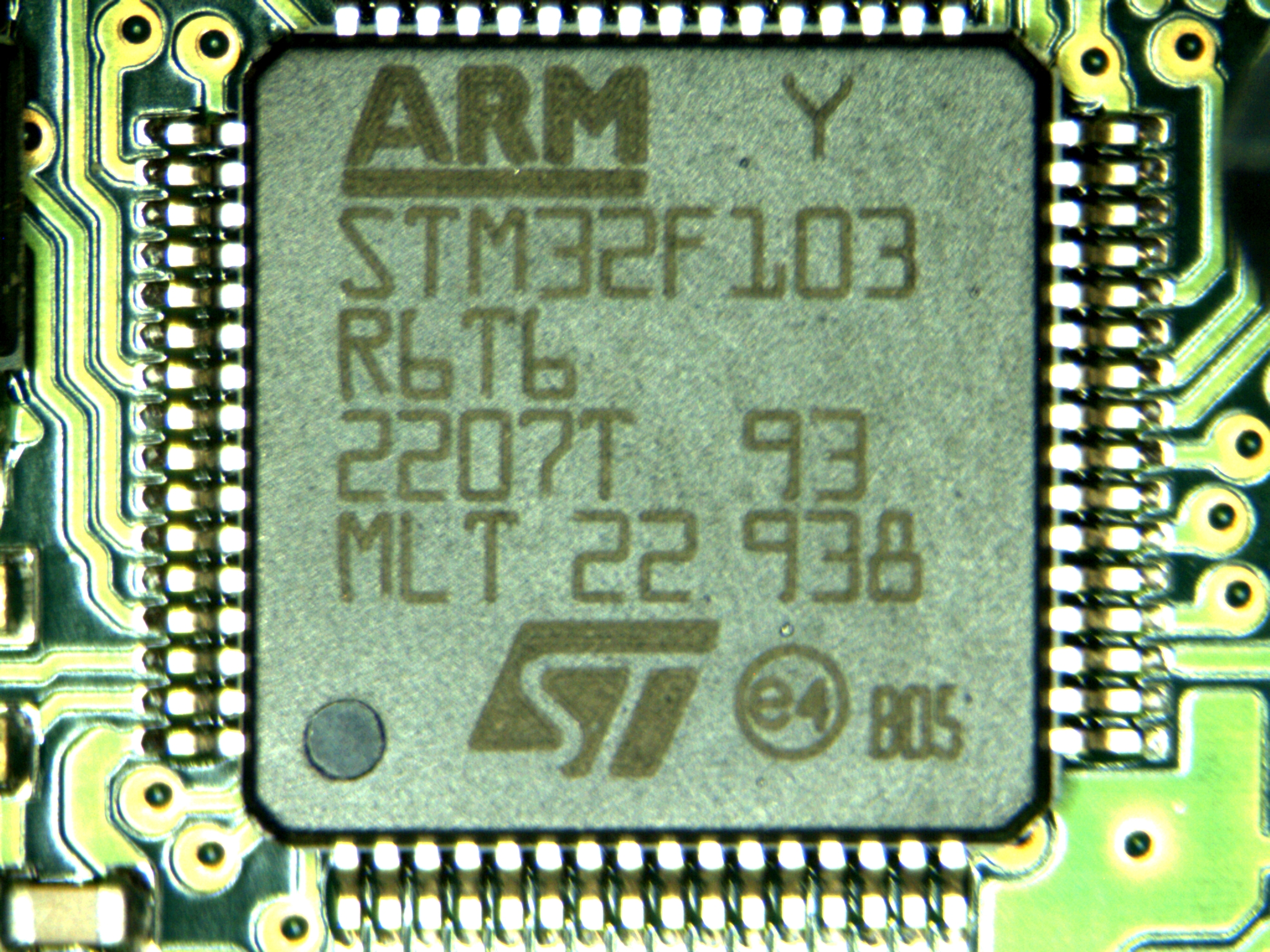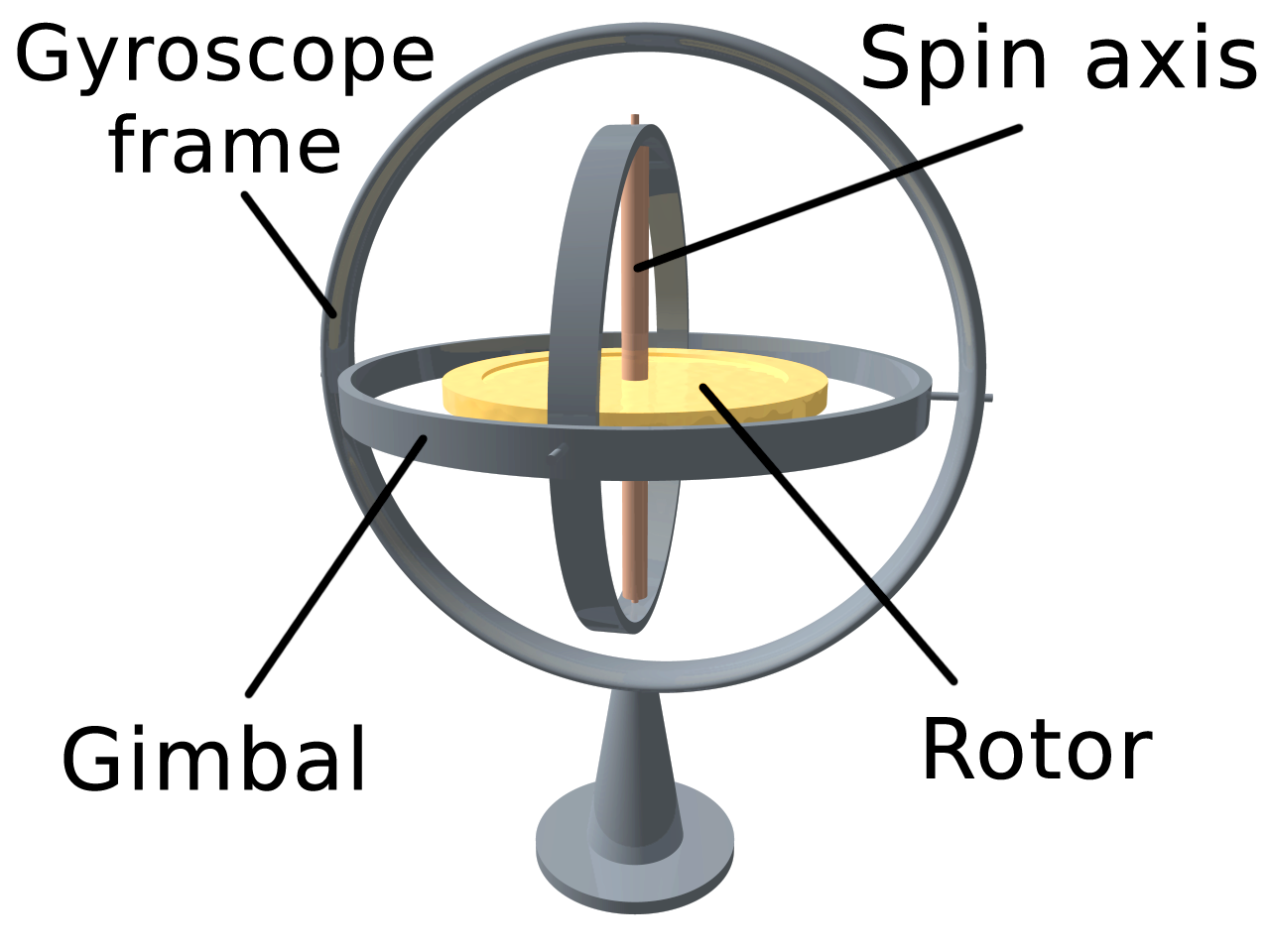|
Apple S1
The Apple S1 is the integrated computer in the Apple Watch, and it is described as a "System in Package" (SiP) by Apple Inc. Samsung is said to be the main supplier of key components, such as the RAM and NAND flash storage, and the assembly itself, but early teardowns reveal RAM and flash memory from Toshiba and Micron Technology. System-in-Package design It uses a customized application processor that together with memory, storage and support processors for wireless connectivity, sensors and I/O constitute a complete computer in a single package. This package is filled with resin for durability. Components From reverse engineering, the processor handling the Wi-Fi and Bluetooth is a Broadcom BCM43342 and the six-axis gyroscope is from STMicroelectronics. *Apple designed 32-bit ARMv7 based application processor APL0778 as the central processing unit (CPU), with an integrated PowerVR SGX543 graphics processing unit (GPU). *512 MB DRAM from Elpida, wire bonded on top ... [...More Info...] [...Related Items...] OR: [Wikipedia] [Google] [Baidu] |
AnandTech
''AnandTech'' is an online computer hardware magazine owned by Future plc. It was founded in 1997 by then-14-year-old Anand Lal Shimpi, who served as CEO and editor-in-chief until August 30, 2014, with Ryan Smith replacing him as editor-in-chief. The web site is a source of hardware reviews for off-the-shelf components and exhaustive benchmarking, targeted towards computer building enthusiasts, but later expanded to cover mobile devices such as smartphones and tablets.For instance by: * * * * * Its investigative articles have been cited by other technology news sites like PC Magazine and The Inquirer. Some of their articles on mass-market products such as mobile phones are syndicated by CNNMoney. The large accompanying forum is recommended by some books for bargain hunting in the technology field. AnandTech was acquired by Purch on 17 December 2014. Purch was acquired by Future in 2018. History In its early stages, Matthew Witheiler served as co-owner and Senior Hardware ... [...More Info...] [...Related Items...] OR: [Wikipedia] [Google] [Baidu] |
Resin
In polymer chemistry and materials science, resin is a solid or highly viscous substance of plant or synthetic origin that is typically convertible into polymers. Resins are usually mixtures of organic compounds. This article focuses on naturally occurring resins. Plants secrete resins for their protective benefits in response to injury. The resin protects the plant from insects and pathogens. Resins confound a wide range of herbivores, insects, and pathogens, while the volatile phenolic compounds may attract benefactors such as parasitoids or predators of the herbivores that attack the plant. Composition Most plant resins are composed of terpenes. Specific components are alpha-pinene, beta-pinene, delta-3 carene, and sabinene, the monocyclic terpenes limonene and terpinolene, and smaller amounts of the tricyclic sesquiterpenes, longifolene, caryophyllene, and delta-cadinene. Some resins also contain a high proportion of resin acids. Rosins on the other hand are less ... [...More Info...] [...Related Items...] OR: [Wikipedia] [Google] [Baidu] |
Near Field Communication
Near-field communication (NFC) is a set of communication protocols that enables communication between two electronic devices over a distance of 4 cm (1 in) or less. NFC offers a low-speed connection through a simple setup that can be used to bootstrap more-capable wireless connections. Like other "proximity card" technologies, NFC is based on inductive coupling between two so-called antennas present on NFC-enabled devices—for example a smartphone and a printer—communicating in one or both directions, using a frequency of 13.56 MHz in the globally available unlicensed radio frequency ISM band using the ISO/IEC 18000-3 air interface standard at data rates ranging from 106 to 424 kbit/s. The standards were provided by the NFC Forum. The forum was responsible for promoting the technology and setting standards and certifies device compliance. Secure communications are available by applying encryption algorithms as is done for credit cards and if they fit the crite ... [...More Info...] [...Related Items...] OR: [Wikipedia] [Google] [Baidu] |
Wire Bonding
Wire bonding is the method of making interconnections between an integrated circuit (IC) or other semiconductor device and its packaging during semiconductor device fabrication. Although less common, wire bonding can be used to connect an IC to other electronics or to connect from one printed circuit board (PCB) to another. Wire bonding is generally considered the most cost-effective and flexible interconnect technology and is used to assemble the vast majority of semiconductor packages. Wire bonding can be used at frequencies above 100 GHz. [...More Info...] [...Related Items...] OR: [Wikipedia] [Google] [Baidu] |
Elpida Memory
Micron Memory Japan, K.K. is a Japanese subsidiary of Micron Technology. It was formerly known as established in 1999 that developed, designed, manufactured and sold dynamic random-access memory (DRAM) products. It was also a semiconductor foundry. With headquarters in Yaesu, Chūō, Tokyo, Japan, it was initially formed under the name NEC Hitachi Memory in 1999 by the merger of the Hitachi and NEC DRAM businesses. In the following year it took on the name Elpida. In 2003, Elpida took over the Mitsubishi DRAM business. In 2004, it listed its shares in the first section of the Tokyo Stock Exchange. In 2012, those shares were delisted as a result of its bankruptcy. In 2013, Elpida was acquired by Micron Technology. On February 28, 2014, Elpida changed its name to Micron Memory Japan and Elpida Akita changed its name to Micron Akita, Inc. History Elpida Memory was founded in 1999 as a merger of NEC's and Hitachi's DRAM operations and began development operations for DRAM pro ... [...More Info...] [...Related Items...] OR: [Wikipedia] [Google] [Baidu] |
Dynamic Random-access Memory
Dynamic random-access memory (dynamic RAM or DRAM) is a type of random-access semiconductor memory that stores each bit of data in a memory cell, usually consisting of a tiny capacitor and a transistor, both typically based on metal-oxide-semiconductor (MOS) technology. While most DRAM memory cell designs use a capacitor and transistor, some only use two transistors. In the designs where a capacitor is used, the capacitor can either be charged or discharged; these two states are taken to represent the two values of a bit, conventionally called 0 and 1. The electric charge on the capacitors gradually leaks away; without intervention the data on the capacitor would soon be lost. To prevent this, DRAM requires an external ''memory refresh'' circuit which periodically rewrites the data in the capacitors, restoring them to their original charge. This refresh process is the defining characteristic of dynamic random-access memory, in contrast to static random-access memory (SRAM ... [...More Info...] [...Related Items...] OR: [Wikipedia] [Google] [Baidu] |
Graphics Processing Unit
A graphics processing unit (GPU) is a specialized electronic circuit designed to manipulate and alter memory to accelerate the creation of images in a frame buffer intended for output to a display device. GPUs are used in embedded systems, mobile phones, personal computers, workstations, and game consoles. Modern GPUs are efficient at manipulating computer graphics and image processing. Their parallel structure makes them more efficient than general-purpose central processing units (CPUs) for algorithms that process large blocks of data in parallel. In a personal computer, a GPU can be present on a video card or embedded on the motherboard. In some CPUs, they are embedded on the CPU die. In the 1970s, the term "GPU" originally stood for ''graphics processor unit'' and described a programmable processing unit independently working from the CPU and responsible for graphics manipulation and output. Later, in 1994, Sony used the term (now standing for ''graphics processing unit'' ... [...More Info...] [...Related Items...] OR: [Wikipedia] [Google] [Baidu] |
Central Processing Unit
A central processing unit (CPU), also called a central processor, main processor or just processor, is the electronic circuitry that executes instructions comprising a computer program. The CPU performs basic arithmetic, logic, controlling, and input/output (I/O) operations specified by the instructions in the program. This contrasts with external components such as main memory and I/O circuitry, and specialized processors such as graphics processing units (GPUs). The form, design, and implementation of CPUs have changed over time, but their fundamental operation remains almost unchanged. Principal components of a CPU include the arithmetic–logic unit (ALU) that performs arithmetic and logic operations, processor registers that supply operands to the ALU and store the results of ALU operations, and a control unit that orchestrates the fetching (from memory), decoding and execution (of instructions) by directing the coordinated operations of the ALU, registers and other co ... [...More Info...] [...Related Items...] OR: [Wikipedia] [Google] [Baidu] |
ARMv7
ARM (stylised in lowercase as arm, formerly an acronym for Advanced RISC Machines and originally Acorn RISC Machine) is a family of reduced instruction set computer (RISC) instruction set architectures for computer processors, configured for various environments. Arm Ltd. develops the architectures and licenses them to other companies, who design their own products that implement one or more of those architectures, including system on a chip (SoC) and system on module (SOM) designs, that incorporate different components such as memory, interfaces, and radios. It also designs cores that implement these instruction set architectures and licenses these designs to many companies that incorporate those core designs into their own products. There have been several generations of the ARM design. The original ARM1 used a 32-bit internal structure but had a 26-bit address space that limited it to 64 MB of main memory. This limitation was removed in the ARMv3 series, which ha ... [...More Info...] [...Related Items...] OR: [Wikipedia] [Google] [Baidu] |
32-bit
In computer architecture, 32-bit computing refers to computer systems with a processor, memory, and other major system components that operate on data in 32-bit units. Compared to smaller bit widths, 32-bit computers can perform large calculations more efficiently and process more data per clock cycle. Typical 32-bit personal computers also have a 32-bit address bus, permitting up to 4 GB of RAM to be accessed; far more than previous generations of system architecture allowed. 32-bit designs have been used since the earliest days of electronic computing, in experimental systems and then in large mainframe and minicomputer systems. The first hybrid 16/32-bit microprocessor, the Motorola 68000, was introduced in the late 1970s and used in systems such as the original Apple Macintosh. Fully 32-bit microprocessors such as the Motorola 68020 and Intel 80386 were launched in the early to mid 1980s and became dominant by the early 1990s. This generation of personal computers coincided ... [...More Info...] [...Related Items...] OR: [Wikipedia] [Google] [Baidu] |
STMicroelectronics
STMicroelectronics N.V. commonly referred as ST or STMicro is a Dutch multinational corporation and technology company of French-Italian origin headquartered in Plan-les-Ouates near Geneva, Switzerland and listed on the French stock market. ST is the largest European semiconductor contract manufacturing and design company. The company resulted from the merger of two government-owned semiconductor companies in 1987: Thomson Semiconducteurs of France and SGS Microelettronica of Italy. History ST was formed in 1987 by the merger of two government-owned semiconductor companies: Italian SGS Microelettronica (where SGS stands for ''Società Generale Semiconduttori'', "Semiconductors' General Company"), and French Thomson Semiconducteurs, the semiconductor arm of Thomson. SGS Microelettronica originated in 1972 from a previous merger of two companies: * ATES (Aquila Tubi e Semiconduttori), a vacuum tube and semiconductor maker headquartered in L'Aquila, the regional capital of the r ... [...More Info...] [...Related Items...] OR: [Wikipedia] [Google] [Baidu] |
Gyroscope
A gyroscope (from Ancient Greek γῦρος ''gŷros'', "round" and σκοπέω ''skopéō'', "to look") is a device used for measuring or maintaining orientation and angular velocity. It is a spinning wheel or disc in which the axis of rotation (spin axis) is free to assume any orientation by itself. When rotating, the orientation of this axis is unaffected by tilting or rotation of the mounting, according to the conservation of angular momentum. Gyroscopes based on other operating principles also exist, such as the microchip-packaged MEMS gyroscopes found in electronic devices (sometimes called gyrometers), solid-state ring lasers, fibre optic gyroscopes, and the extremely sensitive quantum gyroscope. Applications of gyroscopes include inertial navigation systems, such as in the Hubble Space Telescope, or inside the steel hull of a submerged submarine. Due to their precision, gyroscopes are also used in gyrotheodolites to maintain direction in tunnel mining. Gyroscopes ca ... [...More Info...] [...Related Items...] OR: [Wikipedia] [Google] [Baidu] |
.jpg)






